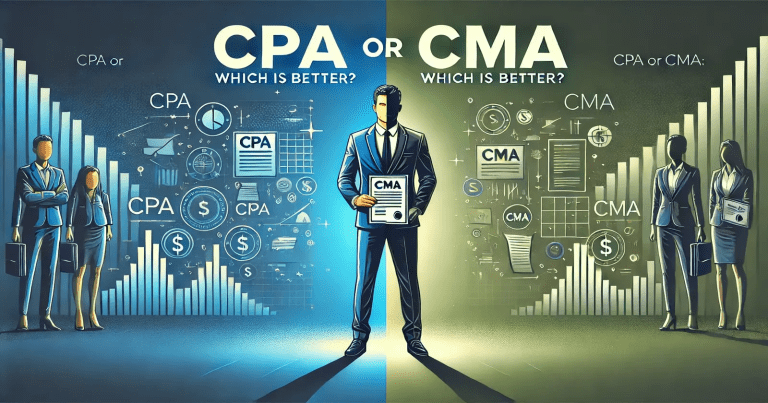CPA or CMA Which is Better, is one of the critical questions that should be addressed to all finance and accounting professionals. Both of these certifications are globally recognized and offer great prospects in the field of work, but they cater to different skills and professional interests. Choosing between the two would depend on your interests, career aspirations, and specialization in the respective fields. Let’s get into the core differences, career scopes, and suitability of both for respective industries.
The question of CPA or CMA which is better ?, often arises for professionals exploring career advancement in the fields of accounting and finance. Certified Public Accountant (CPA) and Certified Management Accountant (CMA) certifications are globally respected and unlock lucrative opportunities. However, they serve distinct purposes. CPA focuses on public accounting, auditing, and taxation, while CMA emphasizes management accounting, strategic decision-making, and financial leadership.
What Is CPA?
The CPA, or Certified Public Accountant, is one of the most respected credentials in accounting and finance. It is often associated with expertise in areas such as financial reporting, auditing, taxation, and compliance. CPAs are essential in ensuring that companies adhere to financial laws and accounting standards. The CPA certification is especially popular in countries like the United States, Canada, and Australia, but its global relevance makes it a coveted credential for professionals worldwide.
Generally, US CPA are involved with areas that would require strong analytical and technical skills. Their work tends to be reviewing financial statements; ensuring compliance under standards such as GAAP, or IFRS; and giving advice related to tax. CPAs typically work for some of the high-end audit firms, multinational corporations, and consulting firms. The accreditation provides a scope of opportunities for all those who wish to work within public accounting and regulatory environments.
What Is CMA?
The CMA or Certified Management Accountant, is a globally recognized certification focused on strategic financial management. It is different from the CPA, which is mainly concerned with compliance and reporting. The CMA is meant to prepare professionals for roles that require decision-making, budgeting, and performance management. It is relevant for those who aim to work in management or leadership roles within organizations.
The US CMA can prepare professionals to analyze financial data and can further offer insights that can be helpful for business planning. The cost management and financial strategy thus form the core of such industries where professionals value the CMA. The most common occupation for CMAs is that of financial analysts, management accountants, and indeed CFOs. The certification is recognized in regions like India, the Middle East, and the United States, making it a good choice for those looking to work in multinational environments. For individuals who aspire to influence business decisions and contribute to long-term strategies, the CMA is an excellent option.
Differences Between US CPA and US CMA
Both certifications have different focus areas. CPAs are mainly engaged in auditing, compliance, and tax-related work, whereas CMAs focus on cost management, strategic planning, and internal financial analysis. The CPA certification offers wider scope opportunities around the world, whereas the CMA is ideal for managerial positions in corporations. It depends on which one you can envision yourself working in: public accounting or business strategy and management.
For example, if you are interested in auditing and compliance with regulatory requirements, then a CPA would be more suitable. If you are interested in cost analysis, budgeting, and long-term financial planning, then CMA would be more aligned with your goals.
| Feature | CPA | CMA |
| Full Form | Certified Public Accountant | Certified Management Accountant |
| Focus Area | Financial reporting, Auditing | Strategic Management, Decision Making |
| Key Skills | Auditing, Taxation | Financial Planning, Analysis |
| Exam Difficulty | High | Moderate to High |
| Global Recognition | Higher | Strong but niche |
| Typical Roles | Auditor, Tax Consultant | Financial Analyst, CFO |
| Average Salary in India | ₹7-10 Lakhs/year | ₹6-9 Lakhs/year |
| Eligibility | Accounting/Finance Degree | Any Bachelor’s Degree |
CPA vs CMA – Skills
CPAs and CMAs differ in their skills, and the knowledge they provide serves different career tracks. A CPA needs to learn all the technical skills related to accounting, such as tax laws, auditing procedures, and financial reporting. Analytical skills are part of the skill set of a CPA because often they have to work with intricate financial information and issues related to compliance. Interpersonal skills are also necessary for CPAs to work with clients, stakeholders, and regulatory authorities.
On the other hand, CMAs develop more skills that would be aligned with strategic decisions and management. They have to understand financial planning, cost control, and performance analysis. The CMAs would act as consultants to business leaders, using insights from them to fashion strategies and achieve financial stability. Leadership, communication, and problem-solving are key characteristics that define the role of a CMA within an organization.
While both certifications require technical expertise, CPAs lean toward compliance, while CMAs focus on strategy and management.
CMA vs CPA – Eligibility
The eligibility requirements for CPA and CMA differ significantly, making it essential to evaluate which certification you can qualify for based on your education and professional background.
The CPA certification has strict educational requirements. In India, you must hold a bachelor’s degree in accounting or finance and complete 150 credit hours of education, which often includes a master’s degree. Moreover, candidates must pass the four-section CPA exam and gain relevant work experience under a licensed CPA.
The CMA is relatively lenient on the requirements. All one needs is a bachelor’s degree in any field of study and an IMA membership. For certification as a CMA, a two-part exam and two years of work experience in management accounting or financial management must be fulfilled. This allows professionals from any educational background to achieve the CMA certification.
CPA vs CMA – Curriculum
The distinction between the concentration areas of CPA and CMA can be well highlighted through the context of the exams. The CPA exam contains four sections that are as follows: Auditing and Attestation (AUD), Financial Accounting and Reporting (FAR), Regulation (REG), and Business Environment and Concepts (BEC). Every section tests the candidate on technical aspects such as auditing procedures, tax laws, and accounting standards. there are two parts to the CMA exam. The first part deals with the areas of financial planning, reporting, and analytics, which include budgeting, cost management, and internal controls. The second part focuses on strategic financial management with a focus on risk management, performance analysis, and decision-making. In comparison, the CMA syllabus is more specialized in nature, and targeted at professionals aspiring for leadership roles. The CPA syllabus is broader in scope, targeting public accounting and compliance requirements.
CMA vs CPA – Examination Difficulty
Both are equally challenging but differ depending on the content and structure of the exam. The CPA exam is very extensive, with detailed information required on financial reporting, auditing, and taxation. Each of the four sections is four hours long, while the passing rate stands at about 50-55%. It requires a lot of time and effort to prepare for the CPA exam since the content is so enormous and detailed.
The CMA exam is slightly more targeted, with two four-hour parts. While it also has a high hurdle of 45-50% for passing the exam, this examination tests a person’s efficiency in management and decision-making skills rather than technical accounting concepts. For those who have a strategic mindset, the CMA exam might feel more suited to their strengths.
CPA vs CMA – Career Opportunity & Salary
Both CPA and CMA certification opens up very lucrative career prospects. CPAs generally find job opportunities in the audit firms, public accounting, and taxation fields, with multinational companies and regulatory agencies being the leading employers. CPAs in India receive an average of ₹7-10 Lakhs per year, whereas experienced professionals command ₹15-20 Lakhs or more. The global aspect of CPA guarantees prospects in all sectors and regions.
CMA experts tend to flourish in jobs demanding financial strategy and decisions. They more often work as financial analysts management accountants or even the CFO. For India, salaries of CMAs start from approximately ₹6-9 Lakhs for entry-level positions while they can have as high as ₹15 lakhs or even more for top posts. Besides, CMAs are known for a better balance between work life because their areas of work typically include internal finances, not seasonal auditing or tax periods.
CPA vs CMA- Cost
CPA certification costs more than CMA. For the CPA exams, the registration fee is about $1000-$1500 (₹75,000-₹1,12,000), and when training is considered, the whole cost may come up to ₹4 Lakhs. CMA costs are pretty low as well; the exams and training fees range between ₹1.5-2 Lakhs. For students who look out for cost, this is a cost-effective way to acquire a well-valued credential. It all depends on the goals of your career and the areas in which you are interested. If you are targeting a job in public accounting, taxation, or auditing, the CPA is your best choice. But if you want to shape business strategies and lead financial teams, CMA is your way. Both of these certifications open up lucrative career prospects, but the focus areas and the requirements of the skills are different from each other and target different professional aspirations.
Work-Life Balance and Career Satisfaction
Work-life balance varies between CPA and CMA professionals due to the nature of their work.
CPA Work-Life Balance
- Auditing CPAs work long hours during tax season.
- Corporate roles have better balance.
CMA Work-Life Balance
- CMAs have better balance because there is less seasonal pressure.
- Leadership roles can demand more responsibility.
- Career satisfaction will vary based on your preference for routine work or strategic work.
CPA or CMA Which is Better FAQs
In India, what is better: CPA or CMA?
CPA has global opportunities, particularly in audit and taxation, whereas CMA is adapted to a managerial role in Indian corporates.
What is CMA’s full form?
CMA stands for Certified Management Accountant.
What are the CPA course fees?
CPA course fees vary between ₹2 to ₹4 Lakhs including training as well as examinations.
What is CMA salary in India?
The salary of CMAs varies between ₹6-15 Lakhs according to experience and role.
What are the eligibility criteria for CPA in India?
The eligibility criteria for CPA in India include a bachelor’s degree in accounting or finance, 150 credit hours of education, and relevant work experience.


